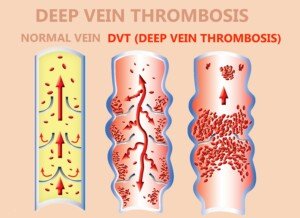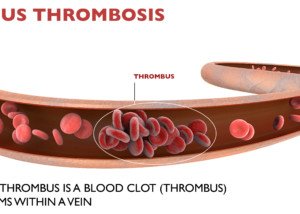
Find out what a doctor says about rheumatic disease’s relation to a deep vein thrombosis.
Psoriatic arthritis is an autoimmune disease that has no cure — only treatments — and for some patients, the flare-ups are resistant to treatments.
One thing that they might worry about is if psoriatic arthritis raises the risk of developing a deep vein thrombosis.
“Rheumatic disease doesn’t cause DVT,” begins Paul Lucas, MD, surgeon with the Vascular Center and director of the Vascular Laboratory at Mercy Hospital in Baltimore.
He continues, “It does, however, pose a risk for the development of DVT. In fact, a three-fold increase researchers have found.”
Risk Factors for a DVT in no Particular Order
- Birth control pills
- Smoking
- Pregnancy
- Sedentary lifestyle
- Long airplane flights with little movement in the legs
- Obesity
- Recent joint replacement or abdominal surgery
- Genetic clotting disorder
- Psoriatic arthritis
Dr. Lucas explains, “The biologic etiology of the elevated risk is a bit tricky. There isn’t anything definitive noted in the literature I looked up.
“There is speculation that there are increases and decreases in various liver proteins and factors that may convey the increased risk.”
What does this mean if you have psoriatic (or rheumatoid) arthritis?
If you have any of the aforementioned risk factors, see which ones that you can modify as much as possible.
Some of them are quite easy to modify, such as standing up and walking around for several minutes, at least once an hour, on a long airline flight or while at your workplace desk.
If you smoke, quit. Yes, just quit already.
Start a plan to lose weight if you’re obese. If you smoke and are also obese, at least you can instantly eliminate one of these DVT risk factors.
If you don’t exercise, it’s time to start. Psoriatic arthritis does not contraindicate exercise.
Finally, drink at least six, eight-ounce glasses of water a day, as dehydration can elevate the risk of a DVT in vulnerable individuals.
 Dr. Lucas leads a team of vascular surgeons and technologists who specialize in the diagnosis and treatment of patients with diseased blood vessels.
Dr. Lucas leads a team of vascular surgeons and technologists who specialize in the diagnosis and treatment of patients with diseased blood vessels.
 Lorra Garrick has been covering medical, fitness and cybersecurity topics for many years, having written thousands of articles for print magazines and websites, including as a ghostwriter. She’s also a former ACE-certified personal trainer.
Lorra Garrick has been covering medical, fitness and cybersecurity topics for many years, having written thousands of articles for print magazines and websites, including as a ghostwriter. She’s also a former ACE-certified personal trainer.
.


























